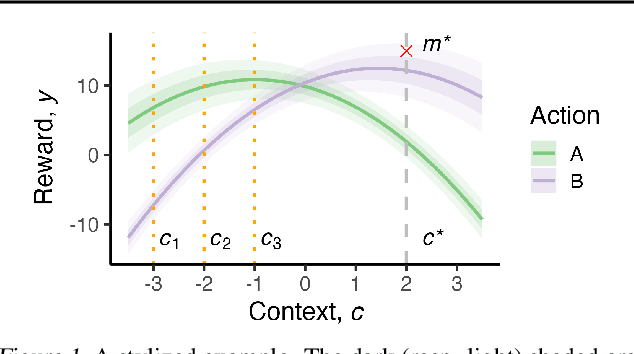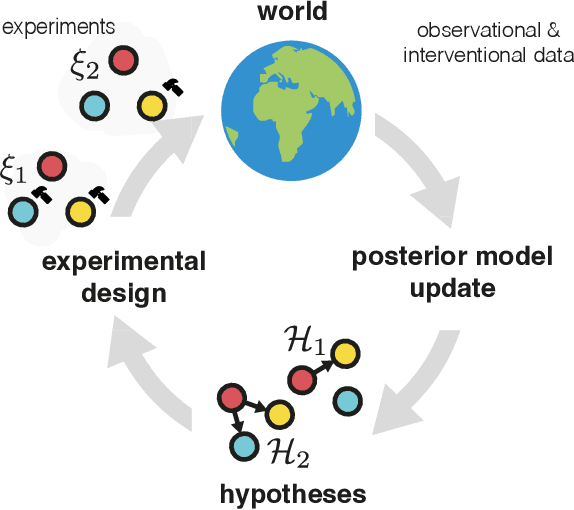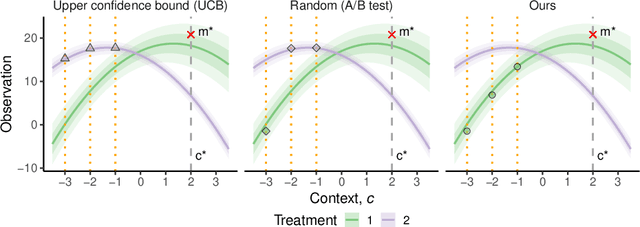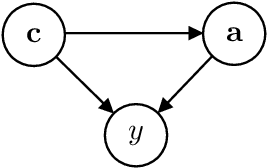Desi R. Ivanova
JADAI: Jointly Amortizing Adaptive Design and Bayesian Inference
Dec 28, 2025Abstract:We consider problems of parameter estimation where design variables can be actively optimized to maximize information gain. To this end, we introduce JADAI, a framework that jointly amortizes Bayesian adaptive design and inference by training a policy, a history network, and an inference network end-to-end. The networks minimize a generic loss that aggregates incremental reductions in posterior error along experimental sequences. Inference networks are instantiated with diffusion-based posterior estimators that can approximate high-dimensional and multimodal posteriors at every experimental step. Across standard adaptive design benchmarks, JADAI achieves superior or competitive performance.
Extending Epistemic Uncertainty Beyond Parameters Would Assist in Designing Reliable LLMs
Jun 09, 2025Abstract:Although large language models (LLMs) are highly interactive and extendable, current approaches to ensure reliability in deployments remain mostly limited to rejecting outputs with high uncertainty in order to avoid misinformation. This conservative strategy reflects the current lack of tools to systematically distinguish and respond to different sources of uncertainty. In this paper, we advocate for the adoption of Bayesian Modeling of Experiments -- a framework that provides a coherent foundation to reason about uncertainty and clarify the reducibility of uncertainty -- for managing and proactively addressing uncertainty that arises in LLM deployments. This framework enables LLMs and their users to take contextually appropriate steps, such as requesting clarification, retrieving external information, or refining inputs. By supporting active resolution rather than passive avoidance, it opens the door to more reliable, transparent, and broadly applicable LLM systems, particularly in high-stakes, real-world settings.
Position: Don't use the CLT in LLM evals with fewer than a few hundred datapoints
Mar 04, 2025Abstract:Rigorous statistical evaluations of large language models (LLMs), including valid error bars and significance testing, are essential for meaningful and reliable performance assessment. Currently, when such statistical measures are reported, they typically rely on the Central Limit Theorem (CLT). In this position paper, we argue that while CLT-based methods for uncertainty quantification are appropriate when benchmarks consist of thousands of examples, they fail to provide adequate uncertainty estimates for LLM evaluations that rely on smaller, highly specialized benchmarks. In these small-data settings, we demonstrate that CLT-based methods perform very poorly, usually dramatically underestimating uncertainty (i.e. producing error bars that are too small). We give recommendations for alternative frequentist and Bayesian methods that are both easy to implement and more appropriate in these increasingly common scenarios. We provide a simple Python library for these Bayesian methods at https://github.com/sambowyer/bayes_evals .
CO-BED: Information-Theoretic Contextual Optimization via Bayesian Experimental Design
Feb 27, 2023



Abstract:We formalize the problem of contextual optimization through the lens of Bayesian experimental design and propose CO-BED -- a general, model-agnostic framework for designing contextual experiments using information-theoretic principles. After formulating a suitable information-based objective, we employ black-box variational methods to simultaneously estimate it and optimize the designs in a single stochastic gradient scheme. We further introduce a relaxation scheme to allow discrete actions to be accommodated. As a result, CO-BED provides a general and automated solution to a wide range of contextual optimization problems. We illustrate its effectiveness in a number of experiments, where CO-BED demonstrates competitive performance even when compared to bespoke, model-specific alternatives.
Differentiable Multi-Target Causal Bayesian Experimental Design
Feb 21, 2023



Abstract:We introduce a gradient-based approach for the problem of Bayesian optimal experimental design to learn causal models in a batch setting -- a critical component for causal discovery from finite data where interventions can be costly or risky. Existing methods rely on greedy approximations to construct a batch of experiments while using black-box methods to optimize over a single target-state pair to intervene with. In this work, we completely dispose of the black-box optimization techniques and greedy heuristics and instead propose a conceptually simple end-to-end gradient-based optimization procedure to acquire a set of optimal intervention target-state pairs. Such a procedure enables parameterization of the design space to efficiently optimize over a batch of multi-target-state interventions, a setting which has hitherto not been explored due to its complexity. We demonstrate that our proposed method outperforms baselines and existing acquisition strategies in both single-target and multi-target settings across a number of synthetic datasets.
Efficient Real-world Testing of Causal Decision Making via Bayesian Experimental Design for Contextual Optimisation
Jul 12, 2022



Abstract:The real-world testing of decisions made using causal machine learning models is an essential prerequisite for their successful application. We focus on evaluating and improving contextual treatment assignment decisions: these are personalised treatments applied to e.g. customers, each with their own contextual information, with the aim of maximising a reward. In this paper we introduce a model-agnostic framework for gathering data to evaluate and improve contextual decision making through Bayesian Experimental Design. Specifically, our method is used for the data-efficient evaluation of the regret of past treatment assignments. Unlike approaches such as A/B testing, our method avoids assigning treatments that are known to be highly sub-optimal, whilst engaging in some exploration to gather pertinent information. We achieve this by introducing an information-based design objective, which we optimise end-to-end. Our method applies to discrete and continuous treatments. Comparing our information-theoretic approach to baselines in several simulation studies demonstrates the superior performance of our proposed approach.
Implicit Deep Adaptive Design: Policy-Based Experimental Design without Likelihoods
Nov 03, 2021



Abstract:We introduce implicit Deep Adaptive Design (iDAD), a new method for performing adaptive experiments in real-time with implicit models. iDAD amortizes the cost of Bayesian optimal experimental design (BOED) by learning a design policy network upfront, which can then be deployed quickly at the time of the experiment. The iDAD network can be trained on any model which simulates differentiable samples, unlike previous design policy work that requires a closed form likelihood and conditionally independent experiments. At deployment, iDAD allows design decisions to be made in milliseconds, in contrast to traditional BOED approaches that require heavy computation during the experiment itself. We illustrate the applicability of iDAD on a number of experiments, and show that it provides a fast and effective mechanism for performing adaptive design with implicit models.
Deep Adaptive Design: Amortizing Sequential Bayesian Experimental Design
Mar 03, 2021



Abstract:We introduce Deep Adaptive Design (DAD), a general method for amortizing the cost of performing sequential adaptive experiments using the framework of Bayesian optimal experimental design (BOED). Traditional sequential BOED approaches require substantial computational time at each stage of the experiment. This makes them unsuitable for most real-world applications, where decisions must typically be made quickly. DAD addresses this restriction by learning an amortized design network upfront and then using this to rapidly run (multiple) adaptive experiments at deployment time. This network takes as input the data from previous steps, and outputs the next design using a single forward pass; these design decisions can be made in milliseconds during the live experiment. To train the network, we introduce contrastive information bounds that are suitable objectives for the sequential setting, and propose a customized network architecture that exploits key symmetries. We demonstrate that DAD successfully amortizes the process of experimental design, outperforming alternative strategies on a number of problems.
 Add to Chrome
Add to Chrome Add to Firefox
Add to Firefox Add to Edge
Add to Edge